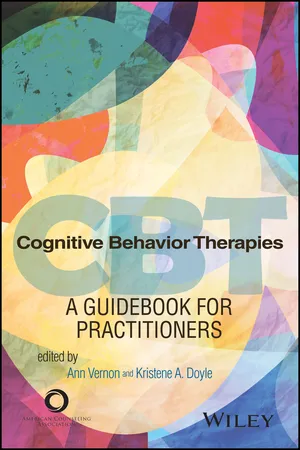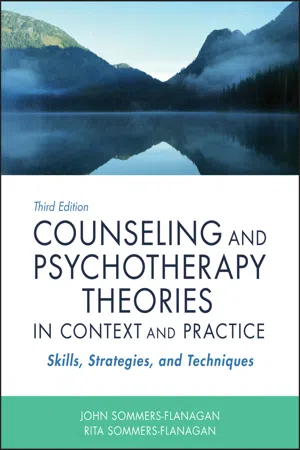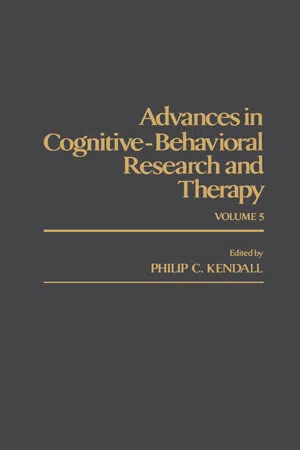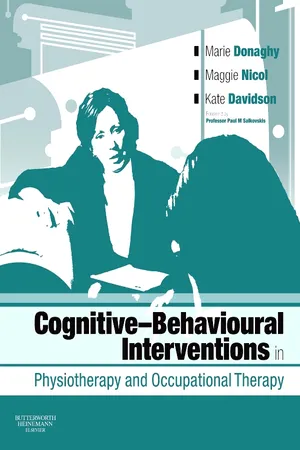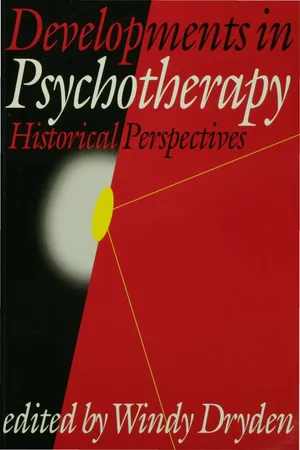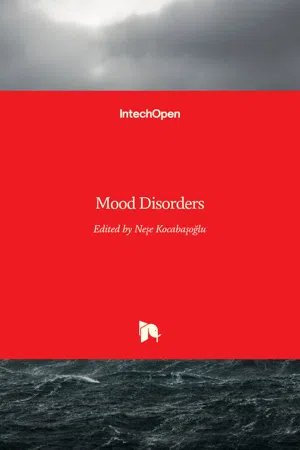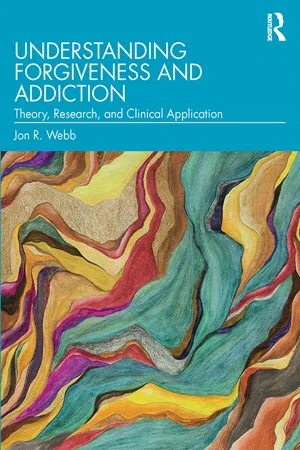Psychology
Aaron Beck
Aaron Beck is a prominent figure in the field of cognitive therapy and is known for developing cognitive therapy, which focuses on identifying and changing negative thought patterns. He is also recognized for his work on depression, where he proposed the cognitive triad theory, suggesting that negative thoughts about the self, the world, and the future contribute to depression.
Written by Perlego with AI-assistance
Related key terms
1 of 5
10 Key excerpts on "Aaron Beck"
- Gerald Corey(Author)
- 2020(Publication Date)
- Cengage Learning EMEA(Publisher)
Through his research, Beck developed a cognitive theory of depres- sion, which represented a new and comprehensive con- ceptualization. He found the cognitions of depressed individuals were characterized by errors in interpretation that he called “cognitive distortions.” For Beck, negative thoughts reflect underlying dysfunctional beliefs and assumptions. When these beliefs are triggered by situ- ational events, a depressive pattern is put in motion. Beck believes clients can assume an active role in modifying their dysfunctional thinking and thereby gain relief from a range of psychiatric conditions. His continuous research in the areas of psychopathology and the utility of cogni- tive therapy eventually earned him a place of prominence in the scientific community in the United States. Beck is the founder of cognitive therapy (CT), one of the most influential and empirically validated approaches to psychotherapy. He has won nearly every national and interna- tional prize for his scientific contributions to psychotherapy and suicide research and was even short-listed for the Nobel Prize in medicine. Beck joined the Department of Psy- chiatry of the University of Pennsylvania in 1954, where he currently holds the posi- tion of University Professor (Emeritus) of Psychiatry. Beck has successfully applied cognitive therapy to depression, generalized anxiety and panic disorders, suicide, alcoholism and drug abuse, eating disorders, marital and relationship prob- lems, psychotic disorders, and personality disorders. He has developed assessment scales for depression, suicide risk, anxiety, self-concept, and personality. He is the founder of the Beck Institute, which is a research and training center directed by one of his four children, Dr. Judith Beck. He has nine grand- children and five great-grandchildren and has been married for more than 60 years.- eBook - ePub
Cognitive Behavior Therapies
A Guidebook for Practitioners
- Ann Vernon, Kristene Anne Doyle(Authors)
- 2017(Publication Date)
- American Counseling Association(Publisher)
It is beyond the scope of this chapter to cover all of the developments in CT theory and practice. However, an overview of the theory and practice of this approach, including an emphasis on a variety of CT interventions and specific applications, is presented. Empirical support for this theory is addressed, and you will have an opportunity to learn more about how the theory works by reading the verbatim case transcript illustrating the therapeutic process of CT.Aaron T. Beck: Key Theorist
Aaron T. Beck was born July 18, 1921, in Rhode Island. He attended Brown University as an undergraduate and received his medical degree from Yale in 1946. In 1954 he joined the Department of Psychiatry at the University of Pennsylvania where he is a professor emeritus. Beck is the father of four children. His daughter Judith is also a renowned CT trainer and president of the Beck Institute for Cognitive Behavior Therapy, which her father founded (Aaron T. Beck, n.d.).Beck started developing a cognitive approach to mental disorders in the 1950s while he was working as a psychiatrist and researcher and testing the psychoanalytic theory of depression, namely, that depression is an expression of an unconscious anger toward the self. As the predictions proved to be unsupported, Beck began to have doubts about the scientific status of this theory and instead started to work on the idea that depression might in fact be a form of thought disorder reflecting erroneous patterns of thinking (J. S. Beck, 2011; Padesky, 2004). During the 1960s and 1970s he developed a scale for measuring depressive symptoms, the Beck Depression Inventory (A. T. Beck, Ward, Mendelson, Mock, & Erbaugh, 1961), and published his first books describing the cognitive theory of depression and emotional disorders (A. T. Beck, 1967, 1972, 1976). Also during this period he published the first treatment protocol for depression (A. T. Beck, Rush, Shaw, & Emery, 1979) and conducted the first clinical trial testing the efficacy of his new approach (Rush, Beck, Kovacs, & Hollon, 1977). In fact, this was the first clinical trial comparing in a rigorous scientific manner the efficacy of a psychological intervention with that of medication (Padesky, 2004; Wills, 2009). This was a cornerstone in the evolution of modern psychotherapy and has become a model for the evidence-based approach of psychological interventions. During the same period, Beck also made significant contributions to the scientific study of suicide, introducing the concept of hopelessness and publishing several relevant scales for measuring suicide risk (Padesky, 2004). In the 1980s and 1990s he expanded his research from depression to anxiety disorders, addiction, and even personality disorders. For each of these psychological problems, his approach was to first describe the cognitive model that would explain the symptoms and then develop a treatment and test it in outcome studies (A. T. Beck, Davis, & Freeman, 2004; D. A. Clark & Beck, 2010; Padesky, 2004; Wills, 2009). Toward the second millennium he extended CT theory to the understanding and treatment of schizophrenia (A. T. Beck & Rector, 2000, 2005). - eBook - PDF
Counseling and Psychotherapy Theories in Context and Practice
Skills, Strategies, and Techniques
- John Sommers-Flanagan, Rita Sommers-Flanagan(Authors)
- 2018(Publication Date)
- Wiley(Publisher)
KEY FIGURES AND HISTORICAL CONTEXT 203 period in the hospital. During this time he was held back a year in school and began believing he was not very smart. He overcame this difficult situation and his nega-tive beliefs about himself, eventually obtaining a medical degree from Yale in 1953. Like Adler, Rogers, Perls, and Ellis, Beck was psy-choanalytically trained. Early on, he became interested in validating Freud’s anger-turned-inward-upon-the-self theory of depression. Instead he ended up reject-ing Freud’s theory and articulating his own (Beck, 1961, 1963, 1970). Psychoanalytic colleagues ostracized Beck for ques-tioning Freud (Weishaar, 1993). However, over time, Beck’s work on depression was recognized as empirically valid. His theory of depression and specific approaches to its treatment are two of the best-known and most scien-tifically supported discoveries in counseling and psycho-therapy. Beck discovered the centrality of cognition to human functioning while conducting psychoanalysis: [T]he patient volunteered the information that while he had been expressing anger-laden criticisms of me, he had also had continual thoughts of a self-critical nature. He described two streams of thought occurring at about the same time; one stream having to do with his hostility and criticisms, which he had expressed in free association, and another that he had not expressed. He then reported the other stream of thoughts: “I said the wrong thing … I shouldn’t have said that … I’m wrong to criticize him … I’m bad … He won’t like me … I’m bad … I have no excuse for being so mean.” (Beck, 1976, pp. 30–31) This led Beck to conclude that focusing on this “other stream of consciousness” was more valuable than psycho-analytic free association. Beck’s approach to therapy is known as cognitive therapy . He reasoned: [P]sychological problems can be mastered by sharpening discriminations, correcting misconceptions and learning more adaptive attitudes. - eBook - PDF
- Philip C. Kendall(Author)
- 2013(Publication Date)
- Academic Press(Publisher)
In the latter part of the article Rowe's personal construct therapy for depression is introduced (Rowe, 1978, 1983). Rowe's ideas about the nature of depressive beliefs and the way that these may be changed are directly relevant to Beck's central claims. II. BECK'S COGNITIVE THERAPY FOR DEPRESSION Beck has written extensively on the so-called paradoxes of depres-sion, that is, the tendency in depressed people to act against their own welfare and their natural instincts. Interestingly, Beck's cognitive ther-apy also provokes a paradox: This highly psychological and pragmatic method of treatment was in fact developed by a psychoanalytically trained psychiatrist with a strong background in conventional, diagnos-tic medicine. Just as the paradoxes of depression are revealed after Changes in Depressive Beliefs 91 careful analysis not to be paradoxical at all, so cognitive therapy reflects something of the background of its originator that might at first not be obvious. It was Beck's psychoanalytical training that led him to listen carefully to his patients' thoughts and feelings. He describes how he first became aware of the importance of negative thoughts. A patient in the course of free association had been criticizing me angrily. After a pause, I asked him what he was feeling. He responded, I feel very guilty. At the time, I was satisfied that I understood the sequence of psychological events. According to the conventional psychoanalytic model, there was a simple cause-and-effect relation between his hostility and guilt; that is, his hostility led directly to guilty feeling. There was no need, according to the theoretical scheme, to interpose any other links in the chain. But then the patient volunteered the information that while he had been express-ing anger-laden criticisms of me, he had also had continual thoughts of a self-critical nature. - Marie Donaghy, Maggie Nicol, Kate M. Davidson(Authors)
- 2008(Publication Date)
- Butterworth-Heinemann(Publisher)
Chapter 1 Cognitive–behavioural therapy: origins and developments Kate Davidson 3 Chapter 2 Incorporating cognitive–behavioural approaches into models of practice Maggie Nicol 19 Chapter 3 Biomedical links between cognitions and behaviour Jan S Gill 33 1 Part Theoretical context 1 This page intentionally left blank Cognitive– behavioural therapy: origins and developments Kate Davidson The origins of cognitive–behavioural therapy A T Beck, the founder of cognitive–behavioural therapy, was born in 1921 in the United States. He was educated in New England and studied at Brown University before graduating from Yale School of Medicine (Weishaar 1993). Beck completed his analytic training in 1958 at the time when psychoanalytic therapy was the domi- nant model of psychotherapy in the United States. Beck’s observations of a patient’s thoughts and feelings did not seem to fit with psychoanalytic theory. He found evidence from studying the dreams of depressed and non-depressed patients, and from interviews with depressed patients, that depressed patients made specific errors in the content and form of thinking that indicated a general negative bias towards self, others and the world (Beck & Ward 1961, Beck 1963). In addition, he observed that patients described themes concerning being defeated and overwhelmed rather than, as psychoanalytic theory would have predicted, sadomasochistic themes. In psychoanalytic theory, depression was thought to be caused by self-directed hostility or anger turned in onto the self. Beck concluded that depression was characterized by a consistent negative bias towards the self, the world and the future. From these early findings, he developed a more general theory of the emotional disorders in which the appraisal of information about the environment was central.- eBook - PDF
Developments in Psychotherapy
Historical Perspectives
- Windy Dryden(Author)
- 1996(Publication Date)
- SAGE Publications Ltd(Publisher)
In addit ion, the works of leading cognit ive therapists worldwide were combined in a handbook for clinicians, Comprehensive Handbook of Cognitive Therapy (Freeman et aI. , 1989). At the same time, empirical research supported the use of cognitive therapy in such diverse areas as eating disorders (Garner and Bemis, 1982), heroin addict ion (Woody et aI. , 1984), schizophren ia (Perris, 1989), panic attacks (Sokol et aI. , 1989a, 1989b), and in-pat ient depression (Miller et aI. , 1989a, 1989b). A study by Persons, Burns and Perloff (1988) found that, contrary to popular belief, cognitive therapy is effective for patients of different levels of education, income and backgrounds, and not j ust well-educated, psychologically minded clients. Beck also extended the cognitive model to couples therapy in Love Is Never Enough (Beck, 1988). Here Beck lists five addit ional cognit ive distort ions apparent in distressed relationsh ips: (1) tunnel vision in which the person perceives only what fits his or her state of mind; (2) biased explanations or negative attributions about one's partner; (3) negative labelling or name calling; (4) mind reading, which is the assumption that one knows what one's partner is think ing and/or that the partner should be able to intuit what one is think ing; and (5) subjective reasoning or the belief that if one feels an emotion strongly enough, then it must be justified. 200 Developments in Psychotherapy Anxiety disorders A major focus for Beck in the 1980s was the development of a theory of anxiety disorders. In 1985 he published Anxiety Disorders and Phobias, co-authored with Emery and Greenberg (Beck et aI. , 1985a). It describes how the cognitive bias in anxiety blocks accurate perceptions and interpre-tations of threatening situations so that one over-reacts to cues of danger. - eBook - ePub
Introduction to Counseling
An Art and Science Perspective
- Michael Scott Nystul(Author)
- 2015(Publication Date)
- SAGE Publications, Inc(Publisher)
REBT is an educationally oriented approach that attempts to teach a client how to overcome self-defeating cognitive reactions. One of its strengths is its simplicity. It can be taught to the client in terms as simple as the A-B-C-D-E acronym. In time, clients can learn to use the tools necessary to become their own self-therapists and gain control over their mental health.The major weakness of REBT may be its overemphasis on the role of cognition in the etiology of mental disorders and emotional disturbances. In addition, it may oversimplify what is required to effectively restructure cognition. For many clients, much more may be required than simply changing irrational statements to rational statements. REBT also avoids exploring other factors, such as traumatic early-life experiences, which could represent important treatment considerations.Cognitive Therapy
Background Information
During the mid-1950s, Aaron Beck (b. 1921) developed a cognitively oriented approach to treat mental disorders, rejecting his early training in psychoanalysis. Beck is best known for his work on depression (Beck, 1987, 1991; Beck, Rush, Shaw, & Emery, 1979) and anxiety (Beck & Emery, 1985). His early work on depression resulted in the development of the Beck Depression Inventory, which is widely used as a clinical and research instrument.Theory of Personality
“Cognitive therapy is based on a theory of personality that maintains that people respond to life events through a combination of cognitive, affective, motivational, and behavioral responses (Beck & Weishaar, 2014, p. 231). The theory of personality for cognitive therapy emphasizes the role of cognitive processes on the development of mental disorders such as depression and anxiety. Cognitive therapy contends that the etiology of many mental disorders can be directly traced to cognitive dysfunctions involving misinterpreting environmental cues (e.g., “My friend did not show up, so he must not like me”). - eBook - PDF
- Nese Kocabasoglu(Author)
- 2013(Publication Date)
- IntechOpen(Publisher)
Beck holds this cognitive disorder responsible for all psychiatric features of depression. Depressed indi‐ viduals usually aim very high and believe that the world always imposes insurmounta‐ ble obstacles for them. They tend to make their own deficits or low level of ability responsible for unpleasant experiences. Thus, one of the primary goals of therapy is to teach the patients that in addition to their first-person observation (usually actually based on self-contempt), there are other principles of self-control such as self-reinforce‐ ment. Depressed individuals show the tendency to consider their thoughts as being a given fact without cross-checking them with reality. When following this theoretical model, the searching, questioning and modifying of automatic, unperceived thoughts -i.e. the basic attitude of the patient characterizing his/her behavior, emotions and think‐ ing - will become the primary objective of therapy as detailed in section 8.3. For the sake of completeness, it should be mentioned that some authors regard cognitive dysfunctions as being consequences and not the causes [105]. Tringer describes this theo‐ ry as the theory of “uniform structure” (depressive-cognitive structure – DCS; [106]). 7.1.2. Irrational beliefs according to Ellis The concept of Ellis regarding the generation and maintenance of depressive symptoms [107] is very similar to Beck's concept. Ellis assumes that irrational thinking will result in Mood Disorders 70 psychiatric disorders and that both rational and logical thinking can be learned, correspond‐ ingly resulting in reduction of psychological stress. The main purpose of cognitive therapy according to Ellis is also the change of cognition and irrational beliefs (section 8.3), corre‐ spondingly changing emotions and disturbed behaviors. - Sonu Shamdasani, Del Loewenthal, Sonu Shamdasani, Del Loewenthal(Authors)
- 2020(Publication Date)
- Routledge(Publisher)
But neither this manual nor those first-generation manuals which succeeded it were designed for clinical trials. Neither did they describe nor delineate the techniques of a therapy in its entirety. 2 They had a more focal purpose. Our story begins in the next phase, the 1970s, when Aaron Beck repurposed the idea of a manual. Revolutionary virtues attended upon his manual that did not inhere in first-generation ones. Beck’s manual for CTOD Aaron Beck began his career at Penn in the mid-1950s as a psychoanalyst. He specialized in the treatment of depression and conducted psychoanalytic research. As his research progressed, Beck suspected that depression might be a thought disorder – not as severe as schizophrenia but nonetheless evidencing distortions in thought – rather than a mood disorder. Following several professional crises in the early 1960s, he turned his back on organized psychoanalysis. He took a five-year sabbatical (1962–1967) to pursue new ideas about cognitions in depression (Beck, 1967; Rosner, 2012, 2014). He published the two foundational articles on thinking and depression (Beck, 1963, 1964) and his first book (Beck, 1967) during this period of ‘splendid isolation’. This was the period in which cognitive therapy was born. Beck’s frustration with psychoanalysis lay in its culture of dogmatism and loyalty. The professional crises he experienced in the early 1960s were the by-product of a postwar psychoanalytic establishment that held too much power and abused that power with apparent abandon (see Hale, 1995) 3. The analysts in Beck’s orbit who sat in positions of power preached that psychoanalytic theory (especially the unconscious) was inviolable, experimental data were viable only if they supported the theory (and should be thrown out, if not), and skepticism and critique were to be curtailed (with strong-arm tactics, if necessary). Secrecy, not accountability, held sway- eBook - ePub
Understanding Forgiveness and Addiction
Theory, Research, and Clinical Application
- Jon R. Webb(Author)
- 2021(Publication Date)
- Routledge(Publisher)
must never have a slip, or my loved ones should never get upset with me – because, after all, I am trying to recover – the reality is that I likely will have a slip and my loved ones likely will become upset with me (they are human and imperfect too). And, if I absolutely expect or demand these things not to happen, when they do, I likely will feel, behave, cope, and problem-solve in a much different way than if I could back away from absolutely demanding/expecting such to happen (see the ABC Model, above). This does not mean that we cannot have preferences (or even strong preferences), but preferences are not absolutistic in that a preference recognizes that things may or may not happen.Cognitive Behavior Therapy
Originally known as cognitive therapy , Aaron Beck’s system of psychotherapy is now commonly called Cognitive Behavior Therapy (CBT), and four of its most essential principles (again, those that distinguish it from other non-cognitive systems of psychotherapy) consist of (1) the cognitive triad, (2) the source of cognitive dysfunction, (3) the relationship between core beliefs, intermediate beliefs, and automatic thoughts, and (4) the issue of cognitive errors (see Beck, 2011 ). The cognitive triad is in reference to the human tendency to become focused on beliefs and perceptions about themselves (including sense of self, experiences, and the future), others, and the world (Beck et al., 1979 ; Beck, 2011 ). Whether these beliefs and perceptions become problematic or not tends to be related to their qualitative nature. When our beliefs and perceptions in this regard are largely positive, judiciously favorable, and optimistic we tend to be adaptive and able to cope and problem-solve effectively. When said beliefs and perceptions are largely negative, critical, or pessimistic we tend to have difficulty adapting to novel circumstances and thus develop problems with coping and problem solving. Regarding the source of cognitive dysfunction , our perceptions of situations influence how we feel, rather than the situation itself. That is, “how [we] interpret and think about a situation. The situation itself does not directly determine how [we ] feel or what [we ] do ; [our] emotional response is mediated by [our] perception of the situation” (emphasis in original; Beck, 2011
Index pages curate the most relevant extracts from our library of academic textbooks. They’ve been created using an in-house natural language model (NLM), each adding context and meaning to key research topics.

